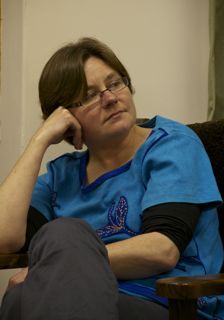
The historical frame of Toni Morrison’s novel Beloved -- America in the years following the emancipation of slaves -- parallels South Africa’s post-apartheid milieu, as does the novel’s trajectory: healing a society still fraught with pain, anger and racism.
Having taught Toni Morrison’s Beloved to third year English students for the past seven years, Dr Deborah Seddon expected to encounter a charged emotional response when she delivered her paper entitled: Be a mighty hard message': Toni Morrison's Beloved and the exploration of whiteness in the post-apartheid classroom.
Perhaps it’s the book’s distance from, though resemblance to South Africa’s own social/historical context, or maybe just Morrison’s mastery of her craft, that leads students into an intense process of self-examination. Whatever the reason, Dr Seddon believes that with Beloved, “Morrison asks characters and readers to re-inhabit the past.”
Interlacing tensions that arise with students in and outside the classroom, Dr Seddon described the characters and conflicts that urge readers to empathise with ‘the other’ in new and profound ways.
What clearly distinguishes this novel is the way it consistently acts as a tool for critical ethical reflection. She acknowledged too, the resistant reaction of some -- the book makes some students uncomfortable to the point of a “critical blindness”.
Most commonly, the book seems to rouse underlying racial issues. For some students, its most destabilising element is that the novel does not provide an identifiable white character, said Dr Seddon. It also habitually unearths unperceived white racial identities. For black students, the book often empowers them to “recognise and resist the pervasive need to assimilate into a white world,” she added.
Because the book is so emotionally influential, Dr. Seddon has learned to offer students alternative ways to engage with it. “You can’t know what a novel has meant to someone by reading an essay -- you can’t know the psychic journey,” she said in the discussion following the seminar.
The final lecture on the novel simultaneously functions as healing exercise where the class works together to create an African American quilt. Each student is given a piece of coloured A4 paper on which they may use any creative method to describe an aspect of the novel that affected them.
Some draw an image, some highlight an important passage, others write poems. This is meant to be a cooperative, cathartic activity which moves from the academic realm of studying literature, into a more personal and specific space, she said.
Beyond the critical acclaim and literary merit of Beloved, the book continues to have relevance because of the radical challenge it posts to readers. It asks a reader to engage in a “painful consciousness,” said Dr Seddon. And nowhere is this process of reflection more necessary than in South Africa, where healing means confronting who we are now by facing the injustices of the past.
Dr. Seddon’s paper is the first in a three-part interdisciplinary seminar series. The next, by a PhD candidate in Edinburgh, Aretha Phiri entitled, “The Poetics of Violence in Toni Morrison’s The Bluest Eye”, will be given on Oct 4 at 17.15 in the Department of English Common Room.
Dr Tom Martin’s “‘Without ever leaving the ground she could fly’: History, Community and the Individual in Morrison and de Beauvoir”, will be given Oct 11 at 17.15, also in the Department of English Common Room.
Photo and story by Hailey Gaunt
